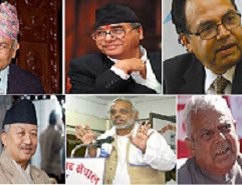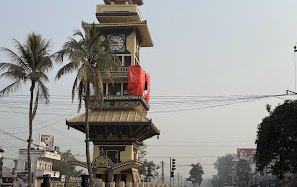
At a time when the CPN-Maoist led 33 parties continue to issue threats to obstruct the November 19 Constituent Assembly elections, the top leaders of major political parties are facing a hard time going canvassing in their own constituencies. In some instances, they are meeting the new rebels. As many top leaders are confined to their own constituencies, a nationwide election campaign is yet to gain a momentum. The recent decision of the Elections Commission to restrict the use of helicopter bars the leaders from travelling to various districts.
In the last elections, Nepali Congress leader late Girija Prasad Koirala attended election campaigns in all the constituencies. UCPN-Maoist leaders Pushpa Kamal Dahal and Dr. Baburam Bhattarai followed Koirala.
Although it is still too early to say anything about the election results, Nepali Congress leader Sushil Koirala, Ram Chandra Poudel, UCPN-Maoist leader Pushpa Kamal Dahal and Dr. Baburam Bhattarai and CPN-UML leader Jhalnath Khanal are facing tough challenges in their own home constituencies.
Among the top politicos, Nepali Congress leader Sher Bahadur Deuba is only one who is reportedly contesting on safe constituencies in two districts of far west. Similarly, UCPN-Maoist leader Narayan Kazi Shrestha is said to have a comfortable position. Similarly, CPN-UML leader and former speaker of Constituent Assembly Subhas Chandra Nembang and Madhav Kumar Nepal have comfortable positions. Leader of Terai Madhesh Loktantrik Party Mahanta Thakur is also facing tough challenges and so many other top leaders are in a similar state.
For the 240 first-past-the-post seats, Nepali Congress, CPN-UML and UCPN-Maoist are clearly in the fray. Even though divided, the Madhesh-based parties will fight back with three national parties in the southern plains. However, parties like RPP, RPP-Nepal and other smaller parties are concentrating more on proportional representatives.
Elections Campaign
With the mobilization of Nepal Army and armed police in almost all constituencies, candidates are now gearing up their campaigns. Nepal Army has already started flag march in all 240 constituencies. Although Nepal Army always plays a crucial role in providing a backup security, this is the first time Nepal Army is directly involved in booth security.
The nationwide election campaign is now in full swing. As all the major political parties have published their own party manifestoes, leaders of political parties are now campaigning for the elections through house to house visits.
With the mobilization of Nepal Army under integrated elections security plan, the law and order situation is said to be improved. Home Ministry has already decided to provide personal security officers to those candidates who seek police protection for their campaign. Home Minister Madhav Prasad Ghimire told this scribe that the law and order situation has improved and there is no security threat for polls.
With the mobilization of national and international monitoring teams throughout the country, the election monitoring has already begun. The international monitors from the European Commission and the Carter Center have already deployed their monitors. Similarly, national election observer groups are also monitoring the elections.
Given the present political scenario, UCPN-Maoist has a very difficult time ahead. Along with harping on the slogan of boycotting elections on November 19, CPN-Maoist leaders have already directed their cadres to vote against UCPN-Maoist candidates. This is likely to benefit Nepali Congress and CPN-UML.
Maoist Threat
The agitating Federal Limbuwan State Council (FLSC) disrupted a mass meet organized by Kamal Thapa-led Rastriya Prajatantra Party-Nepal (RPP-N) in Panchthar on 19 October. FLSC cadres barred RPP-N Co-chairman Padma Sundar Lawati from entering the district. Likewise, FLSC cadres also disrupted a mass meet organized by the Nepali Congress (NC) in the district.
Similarly, the shutdown called by the CPN-Maoist has hit hard normal life in various seven districts of Seti and Mahakali zone since 20 October. The CPN-Maoist-led 33 party alliance organized the strike as a part of their scheduled protests against coming CA election and not to allow the entrance of senior leaders of major four parties in the constituencies.
Although CPN-Maoist led alliance said their agitation will be peaceful, given their recent activities, their ten days’ long general strike, from November 10-19, is likely to be bloody. Nepal Police estimates that CPN-Maoist does not have a nationwide reach to disrupt the election process. CPN-Maoist leader Pampha Bhushal said that her party will launch peaceful agitation against the elections. She confided that their cadres will retaliate against any attempt of suppression.
Election Preparations
The Election Commission is ready to go for polls after making almost all final preparations. Following the opposition from the major political parties, the Election Commission has decided to distribute the voter identity cards before the elections. The Commission has started the printing of voter ID cards on its own.
The Commission published the election symbols allocated to FPTP candidates at the offices of all 240 returning officers across the country. With the withdrawal of the 205, the total number of FPTP candidates now stands at 6,138. Of the 6,343 candidates, 672 were women and one a third gender. Similarly, out of the 1,219 independent candidates, 69 are women
However, it is yet to be clear how the over 10 million voter identity cards will be delivered to the voters given Nepal’s present lethargic government machinery. Chief Election Commissioner Neel Kantha Uprety confided to this scribe that the Election Commission has completed all its programs.
“We will stop the mockery in the name of elections,” said Pampha Bhushal. “I am sure that people will oppose it and boycott it.”
Security challenges
After the incident of assassination in Bara the demand of security from poll candidates has sharply gone up. Nepal Police Spokesperson Nawa Raj Silwal told this scribe that the number of poll candidates demanding personnel security officers (PSOs) has increased, especially in Tarai and eastern hill districts.
Nepal Police has provided at least one PSO to a candidate keeping in view the security threats he or she faces. Apprehensive of the anti-poll activities in the aftermath of the fatal attack, the government has also decided to increase security vigilance.
Home ministry officials directed the security agencies to keep a close watch on candidates from Parsa to Saptari in the south, which is considered the most security sensitive area, and provide them with PSOs while reviewing their security threats. Restive eastern hill districts are equally vulnerable.
Security officials attending the regional security seminars stressed the need to ensure effective coordination among all security agencies, including the army for the polls. Dissenting former Maoist combatants who want to disrupt the election and the open and porous border with India pose huge challenges.
“The government plans to deploy more than 61,000 NA personnel in 240 constituencies as per the integrated security plan. Though most of the mountainous districts have fewer constituencies and are less sensitive in terms of security, we need to deploy sufficient number of NA personnel. Though both Nepal Police and Armed Police Force (APF) have also been deployed, the deployment of NA will depend on the level of security threat during and after the CA polls,” said NA Spokesperson Brigadier General Jagadish Chandra Pokharel.
Security experts, however, expressed dissatisfaction over the mobilization of army in civilian elections. “It seems that the election is going to be held in a military rule. Nepal Army’s active involvement in the election will tarnish its neutral image,” said security expert Indrajit Rai.
Others disagree. “Nepal Army has always played a crucial role in elections security. This is not an exception. There is no harm to mobilize the army under civilian control,” said Nepali Congress leader Arjun Narshing K.C .
Coming Scenario
Security remains a major challenge in the country. There will be a certain level of confrontation during the election period. Given the experience of the last two months, it is unlikely to see Maoists disrupting the elections throughout the country. If a large number of top leaders lose the elections, that will naturally pave the way for young leaders to emerge. At a time when an overwhelming number of voters are young, one cannot rule out the possibility of a new scenario emerging.
As the Army and Police are tightening their presence, the CPN-Maoist is now coming up with a violent mood of retaliation. Given the current political trend, nothing is likely for the CA-II election on November 19.

Keshab Poudel
Poudel is the editor of New Spotlight Magazine.
- ERC Nepal Is Focused On Expanding Distribution And Transmission To The Private Sector: ERC Chair Dr. Dhital
- Jul 06, 2025
- FOURTH PROFESSOR Y.N. KHANAL LECTURE: Nepal-China Relations
- Jun 23, 2025
- Colonel JP CROSS: Centenary Birthday
- Jun 23, 2025
- BEEN: Retrofitted For Green
- May 28, 2025
- GGGI has been promoting green growth in Nepal for a decade: Dr. Malle Fofana
- May 21, 2025















